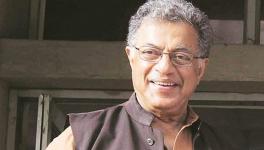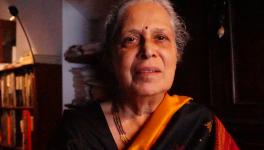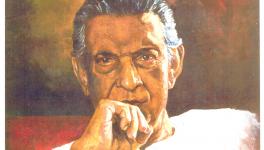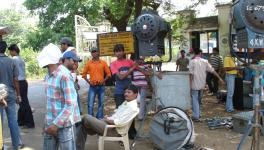This Life at Play
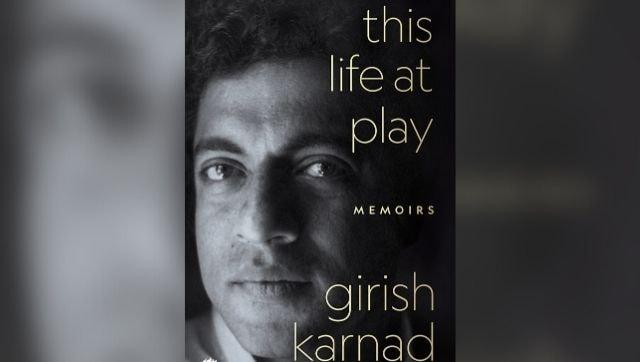
This Life at Play, translated from the Kannada in part by Girish Karnad himself and in part by Srinath Perur, covers the first half of his life from his childhood in Sirsi and his early engagement with local theatre, his education in Dharwad, Bombay and Oxford, to his career in publishing, his successes and travails in the film industry, and his personal and writerly life.
Below are two important excerpts from the book.
Isolated from Mysore and South Kanara, North Karnataka had found a local cultural centre in Dharwad. The city was on the western edge of the Deccan plateau, around a hundred and fifty kilometres from the Goan coastal strip, situated on an outcrop before the Western Ghats plunged down to the sea. It had, therefore, a temperate climate. The British had built many educational institutions there, and Dharwad was admired as a place suitable for retired government servants, college students and poets.
In the Marikamba School in Sirsi, we had been brought up to believe that literary figures were endowed with divine grace. And Dharwad was bursting with such celebrities. One day, while I was still at the Basel Mission School, my Kannada teacher invited a few of us students home for tea. While we were animatedly discussing the state of Kannada literature, a gracious old man in flowing clothes and with a resplendent beard walked in, sat down, chatted with us and left. It turned out to be Aluru Venkata Rao, one of the founding figures of modern Kannada literature. I was so thrilled by the encounter that I went home and wrote a poem about him. Later, I met several such revered figures (though none of them again inspired a poem). In fact, the high density of poets in Dharwad was not particularly conducive to a young man aspiring to be a poet. The cliché was that the city’s population was divided into two species: poets and critics. Another saying went: ‘If you stand in a corner and randomly fling a stone in Dharwad, it will land on the roof of a poet.’ To which a local poet Chennaveera Kanavi added, ‘The stone thrower is invariably a poet too.’
One day, the writer V.K. Gokak came to our school to judge a poetry contest. He was also the principal of Karnatak College, where I hoped to study, and so I observed him intently. Since coming to Dharwad, I had visited Karnatak College several times, gazed longingly at the building, and thrilled at imagining myself in its corridors. The college building had originally been constructed by the Madras and Southern Mahratta Railway for its offices, but a governor of Bombay had been generous enough to acquire it for the education department. It was a magnificent structure in redbrick and steel. The arches of its elegant façade, the wide corridors and spacious classrooms, the grand steps at the front of the college, the spiral staircases at the ends of corridors, all gave it a grandeur in keeping with the stature of the college.
Gokak’s personality matched the college he was principal of: he was a tall man who walked with a long stride and a slight stoop; he had a smiling countenance and a deep, somewhat nasal voice. And in my eyes, he possessed all the glamour of a leading literary figure. As if this weren’t enough, his academic prowess shone about him like a halo: he had studied English literature at Oxford and been awarded the rare ‘congratulatory first’. So, it could be said that he had surpassed our British rulers at their own literature.
Gokak was also known for being an excellent administrator. Karnatak College was a government institution, and it was believed that the then director of public instruction in Poona, D.C. Pavate, had appointed the best teachers he could find, expecting the college to one day be part of Karnatak University. The professors who taught there were authorities in their fields, and Gokak received much praise for being able to manage them all without giving occasion for any friction.
But what made the deepest impression on students was Gokak’s boundless enthusiasm for teaching. Since he taught at all stages of the four-year degree course, every class had the opportunity to interact closely with him. As a result, he too had some idea about what was going on with the students in different classes.
Soon after I joined college, I spoke to him in the corridor after a class. ‘I write poetry,’ I told him. ‘I want to understand modern English poetry. What should I read?’ He took me to his office and said, ‘Sit. Write this down.’ I sat in front of him, practically trembling with eagerness. He said, ‘Had you asked this question to anyone else, they might have asked you to read T.S. Eliot. He’s a good poet, of course. But he’s a difficult poet. Don’t start with him.’ He gave me the names of W.H. Auden, Stephen Spender, Cecil Day-Lewis and Louis MacNeice. I ran at once to the college library.
The evolution of my artistic sensibilities seemed to begin the instant I set foot in college. I could experience this myself from day to day. The novel I had read and adored a week ago would start to feel ordinary. ‘At last, I have written a good poem,’ I would congratulate myself, but the same poem felt childish after a few days. It was the kind of feverish stimulation that the poet Adiga described as ‘Everywhere the hand extends – a switch, a switch.’ Going to the library became a cause for anxiety. It was like stepping into a minefield: there was no telling where a new bud might sprout, when a lightning bolt might strike.
[…]
When I read about Muhammad Tughlaq, I was immediately drawn to two aspects of his life. The first was that, despite being the most brilliant sultan to sit on the throne of Delhi, he came to be regarded as ‘mad’ by both his contemporaries and by posterity. The other was that, for nearly five years of his reign, he had forbidden public prayer. I remember my hair standing on end when I read about this. At the time, I considered myself an atheist, and I believed Tughlaq’s astonishing move must have arisen from his own atheism. As I learnt more about him, I began to realize that it had its origins in his struggles with religion. It was no simple matter to keep faith in god. It was more of a hard penance.
I had written Yayati like a man possessed. It came easily, at one stretch. With Tughlaq, it was the very opposite. First, I had to assimilate all the information I had collected in the library. Then, an imagined detail here, an idea there, a flash of insight elsewhere – all these had to be brought together into a definite form.
Take, for example, a sentence in the last scene: ‘When it comes to washing away filth, no saint is a match for a dhobi.’ I had written it down in my diary when I was in Bombay, two years before I started working on Tughlaq. It was this line that made Aziz a dhobi. From there, images involving changes of attire spread through the play like a creeper. Here, it hardly needs to be said, was also the influence of Caroline Spurgeon’s essay on Macbeth.
I wanted the play to resemble a traditional company natak, and so the pair of characters, Aziz and Aazam, were modelled on the Ramayana’s Akara and Makara. But Aziz grew in stature right in front of my eyes, and stood up as an independent character. I wasn’t sure what to do with him. Then, my friend Krishna Basrur advised me: ‘He must confront the sultan. It is essential they have a face-off.’ I decided he was right. But it took another year before I knew what would happen during that confrontation.
All in all, I struggled for around two years to finish Tughlaq.
This is an excerpt from This Life at Play, written by Girish Karnad, translated from the Kannada by Girish Karnad and Srinath Perur, and published by Fourth Estate. Published here with permission from the publisher.
Girish Karnad (1938–2019) was a playwright, actor and director. His notable plays include, among others, Yayati, Tughlaq, Hayavadana, Naga-Mandala and The Dreams of Tipu Sultan. He worked in films and in TV across various languages – Kannada, Hindi, Tamil, Telugu, Malayalam, English and Assamese – and in a number of capacities, including as actor, screenwriter and director. He served as director of the Film and Television Institute of India (1974–75), chairman of the Sangeet Natak Akademi (1988–93), and director of the Nehru Centre, London (2000–3). His work brought him numerous honours including multiple National Film Awards and Filmfare Awards, the Kalidas Samman, the Sangeet Natak Akademi Award, the Padma Shri, the Padma Bhushan and the Jnanpith Award.
Srinath Perur is the author of If It's Monday, It Must Be Madurai (2013) and the translator of Vivek Shanbhag's Ghachar Ghochar (2015).
Get the latest reports & analysis with people's perspective on Protests, movements & deep analytical videos, discussions of the current affairs in your Telegram app. Subscribe to NewsClick's Telegram channel & get Real-Time updates on stories, as they get published on our website.









